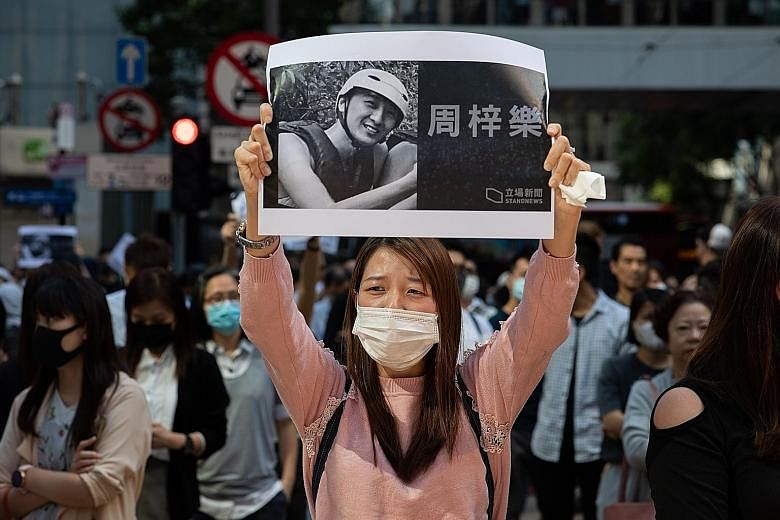HONG KONG • On a Friday evening early last month, an off-duty Hong Kong police officer grabbed his holstered gun and warned away protesters who surrounded him.
One pulled him into a headlock and soon he was swarmed on the ground. A loud bang reverberated through the street. Hours later, photographs of a protester shot in the thigh did the rounds on social media.
Public broadcaster RTHK said that someone had been hit by a live bullet. He was 14.
While idealistic students have played key roles in social and political movements around the world, Hong Kong's teenagers are turning into activists at an unusually young age.
As thousands took to Hong Kong's streets this summer, marching through tear gas and baton-wielding officers, some of those demonstrating had been students just out of, or still in, middle school.
The death last Friday of a 22-year-old student in an area near a clash between the police and protesters threatened to further inflame demonstrations that have become increasingly violent.
Besides the risk of serious injury or death, the teenagers helping fuel the protests also pose a problem for Beijing: They will oversee the transition when the "one country, two systems" framework underpinning Hong Kong's autonomy expires in 2047.
Interviews with three young teens, lawyers and social workers reveal a generation growing politically charged through ideas picked up on social media platforms such as Instagram, Facebook and Telegram.
They have grown up in this former British colony that allows free flow of information and has a lengthy history of feisty protest movements.
But unlike their peers in the West, they place an added value on these freedoms because of fears that they could lose them as Beijing increases its control over their home city.
They do not trust the government, they identify themselves as Hong Kongers rather than Chinese nationals, and they are prepared to keep pushing for more freedoms - putting Asia's financial hub at risk of seeing more violent protest movements for years to come.
"For countries with democracy, they take it for granted," said Ms Agnes Chow, 22, who became a social activist as a 15-year-old student after reading about the government's plans to change the education curriculum to promote nationalism.
"They don't treat it as something special. While to us, it's difficult to gain."
Of the 1,812 people arrested in connection with protests between June 9 and Sept 30, police data shows that 64 - or 3.5 per cent - were under 16, the age when they can be tried in adult court.
Last month, 8.5 per cent of the 1,189 people arrested were minors.










